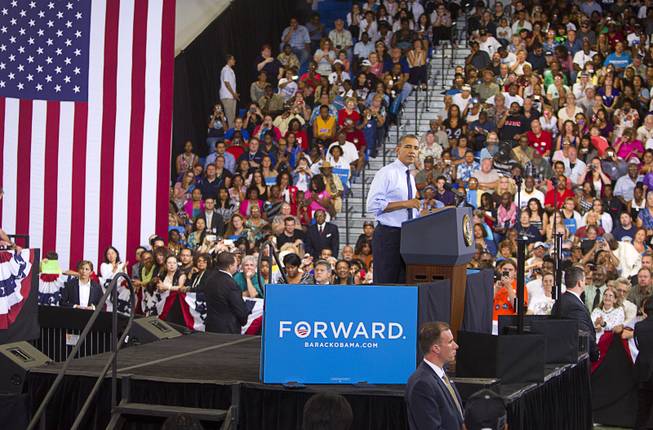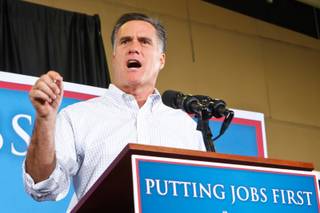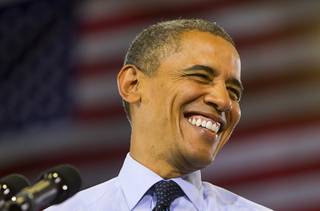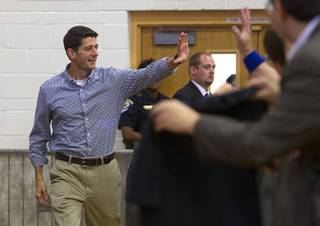
President Barack Obama speaks during a rally at Canyon Springs High School in North Las Vegas Wednesday, Aug. 22, 2012.
Wednesday, Sept. 12, 2012 | 2 a.m.
Sun coverage
Nevada is in the political cross hairs as a swing state in this year’s presidential election, and that means Las Vegas has welcomed President Barack Obama, Republican presidential nominee Mitt Romney and the two candidates’ surrogates numerous times.
Each time a candidate comes to the valley, campaign staffers work out event logistics while various agencies coordinate security for the visits. Some costs of a campaign visit are reimbursed; others are not.
The Clark County School District, for example, has hosted a few campaign events this year at various schools. The district has a spreadsheet with detailed breakdowns of what they charge for use of their facilities and is reimbursed for all costs.
Schools are prime spots for campaign events because they are free from some of the thorns that other venues could present.
“It is very common for campaigns to approach school districts for facilities because we have infrastructure, bleachers, a stage, audio equipment,” said Amanda Fulkerson, spokeswoman for Clark County School District. “Schools are very often looked at for these campaign events because they are government facilities that are probably less expensive than private venues and are less of a political liability. If you do it on the Strip, there are all these issues that come up in politics. Is it union or nonunion? Is the owner donating to certain causes?”
Both campaigns have taken advantage of Clark County school buildings this season. Romney’s running mate, Paul Ryan, packed the Palo Verde High School gym on Aug. 14, and Obama rallied his supporters at Canyon Springs High School eight days later.
Both campaigns either paid upfront for the facilities or on the day of the event, Fulkerson said, and both bills totaled approximately $3,000. When former UNLV basketball player Greg Anthony endorsed Mitt Romney at Rancho High School, the bill for the short event was less than $100.
The School District bills the campaigns for use of utilities, a 12 percent administrative fee, staff time, and wear and tear on school materials, among other things.
In 2008, Obama was in Las Vegas frequently for his campaign and racked up a bill of over $53,000 with the Clark County School District for seven events, two of which were large rallies with more than 15,000 attendees at Bonanza and Coronado high schools that occupied the schools for entire weekends, according to the School District.
The Obama campaign paid about half the bill at the time but left a significant portion unpaid, Fulkerson said. The campaign paid the balance this year.
“During the 2008 campaign, the Obama campaign used quite a bit of our facilities, and the campaign team at the time incurred the charges as opposed to paying them upfront. With the dissolution of the campaign, there were outstanding fees. We were in contact with their people, and we are a government entity that is used to things happening slowly, so it was not extremely concerning. The new bill eventually got paid,” Fulkerson said.
Neither the Obama campaign nor the Romney campaign have any outstanding bills with the School District, Fulkerson added.
Both campaigns declined to offer specifics about how they choose campaign event venues or their reimbursement policies.
The district will work with the campaign to find a suitable location, but high schools are more commonly used because they can accommodate bigger crowds. For example, when Obama came to town in late August, he flew into Nellis Air Force Base and then stayed in the northeast part of the valley by holding his event at Canyon Springs High School.
While Romney arranges his own travel accommodations, the president uses Air Force One and must reimburse the government when he uses the aircraft for campaign purposes.
“As for Air Force One travel, as in past administrations, we follow all rules and regulations to ensure that the campaign or other relevant political committee pays what is required for the president to travel to political events,” White House spokesman Eric Schultz said in an email. “The one difference from the previous administration — due to an FEC regulation change — is that our campaign reimburses the federal government at a rate based on chartering a 737 aircraft rather than a handful of first-class airline tickets.”
While facility and travel expenses are covered, extra security is another matter.
Metro is frequently called upon to support the Department of Homeland Security and the Secret Service in providing security and support for campaign visits.
Metro used to send invoices out to bill for their services but gave up the reimbursement battle years ago after being ignored, Metro spokesman John Sheahan said.
“We meet with the Secret Service, plan routes and carry out the security plan through the day of the event,” Sheahan said. “We pull resources from every area of the department in order to accommodate that. We do not get reimbursed. Many years ago we would submit bills for officers’ participation, and we never got paid. So we quit submitting the bills. Our budget is so tight, though, we can’t afford to bring off-duty officers on to work these events or use overtime.”
The U.S. Secret Service coordinates security for the candidates, and they do not reimburse local agencies for their assistance.
“There is no funding mechanism in place for the Department of Homeland Security or our agency to fund local departments for protective services,” said Rick Shields, U.S. Secret Service special agent in charge at the Las Vegas field office. “There is a strong partnership among federal and local agencies, and locally, the police fortunately support the mission. These are hard times economically for everyone, and agencies are looking for funding.”
Sheahan said Metro willingly collaborates with the federal agencies and accepts the added tasks as part of its public safety mission.
“Our department, like a lot of major city police departments, gets government grants and we receive government assistance on projects,” Sheahan said. “We are partnered with the federal government on task forces. It is more or less a partnership.”
However, Sheahan added, this year has been tougher than 2008, as the department has 238 fewer officers than it did at its peak and currently has 117 vacancies.
“This isn’t an election-year problem,” Sheahan said. “We’re going to have to learn to deal with this as a perennial problem. After the presidential elections, there will be midterm elections. ... There are always people coming to town who will need some sort of augmentation. It’s something we’ve learned to live with on a yearly basis. Sure, it gets bigger on the four-year mark, but it’s something we continually do. ... Everyone comes to Vegas.”




Join the Discussion:
Check this out for a full explanation of our conversion to the LiveFyre commenting system and instructions on how to sign up for an account.
Full comments policy